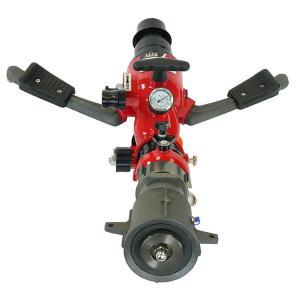Portable fire monitors, as a flexible and mobile piece of equipment, are playing an increasingly critical role in firefighting and various emergency situations requiring high-volume water jets. Unlike large, fixed-mounted monitors or bulky water cannons that require multiple personnel to operate, portable fire monitors offer a range of significant and practical advantages to firefighters, emergency rescue teams, and even specific industrial environments.
Portable fire monitors are typically compact and lightweight, weighing enough to be carried by one person or moved with the aid of a small cart. This allows them to be quickly transported to narrow alleyways, rugged mountain terrain, deep within large factory buildings, between warehouse shelves, and even on ship decks or at the edge of a forest, where fire trucks cannot access them. This on-demand, ready-to-use feature allows firefighting teams to overcome spatial limitations and deploy water monitors immediately at advantageous locations closest to the fire, preempting the fire and effectively controlling its spread.

Portable fire monitors are relatively simple to construct, and connecting to a water source (fire hydrant, fire truck outlet, mobile pump) and water supply hose is typically very quick. There's no complex installation process or commissioning time required; operators can set up and be operational within minutes after basic training. This is crucial in a fire scene where every second counts, especially during the initial stages of firefighting or preventing a small fire from escalating into a larger one. Rapidly establishing a stable, powerful firefighting water flow is often crucial, minimizing the risk of property damage and casualties.
Portable fire monitors feature user-friendly design features such as a simple elevation adjustment mechanism, a lockable swivel base, clear pressure and flow indicators, and ergonomically designed controls. This means even non-expert rescuers, or in emergency situations, can perform basic operations with simple instruction. Furthermore, fixed-mounted monitors require only a small number of personnel (typically one or two) for angle adjustment and monitoring, freeing up manpower for other critical tasks such as fire scene reconnaissance, personnel search and rescue, or operating other equipment, optimizing overall rescue resource allocation.
Despite its portable size, portable fire monitors offer flow rates and range far exceeding those of ordinary fire hoses. Their optimized nozzle design allows them to switch between a direct jet and a diffuse spray pattern depending on the fire situation. Their range typically reaches tens of meters, and their flow rates can reach hundreds or even thousands of liters per minute. This powerful hydraulic performance enables them to effectively suppress intense flames at medium and long distances, cool high-temperature equipment or building surfaces, create safe conditions for firefighters to approach the core of a fire, or establish a secure defense line from a relatively safe distance.
The value of portable fire monitors is not limited to structural fires. They are also suitable for establishing containment zones and suppressing edge fires in the early stages of forest fires, containing spreading fires in petrochemical plants, deep-drain firefighting in large warehouses, performing deck operations on ship fires, diluting and flushing hazardous chemical leaks, and suppressing explosions and dust in large dusty areas. The high-flow water column or mist they provide is a versatile and effective means for cooling, suppressing, diluting, and covering a wide range of operations requiring large volumes of water.
| Benefit Category | Key Features | Primary Advantages |
|---|---|---|
| Mobility | Compact lightweight design Cart transportable | On-demand deployment in inaccessible areas Overcomes spatial limitations |
| Rapid Response | Simple construction Quick water source connection | Minutes-level setup Fights fire escalation effectively |
| Easy Operation | Intuitive controls Lockable swivel base Minimal personnel required | Low training threshold Frees manpower for critical tasks |
| Combat Capability | High flow rate Long range Adjustable spray patterns | Effective flame suppression at distance Creates safe firefighting conditions |
| Multi-Scenario Use | Structural firefighting Forest fire control Hazardous material incidents | Versatile water application Adaptable to diverse emergency situations |